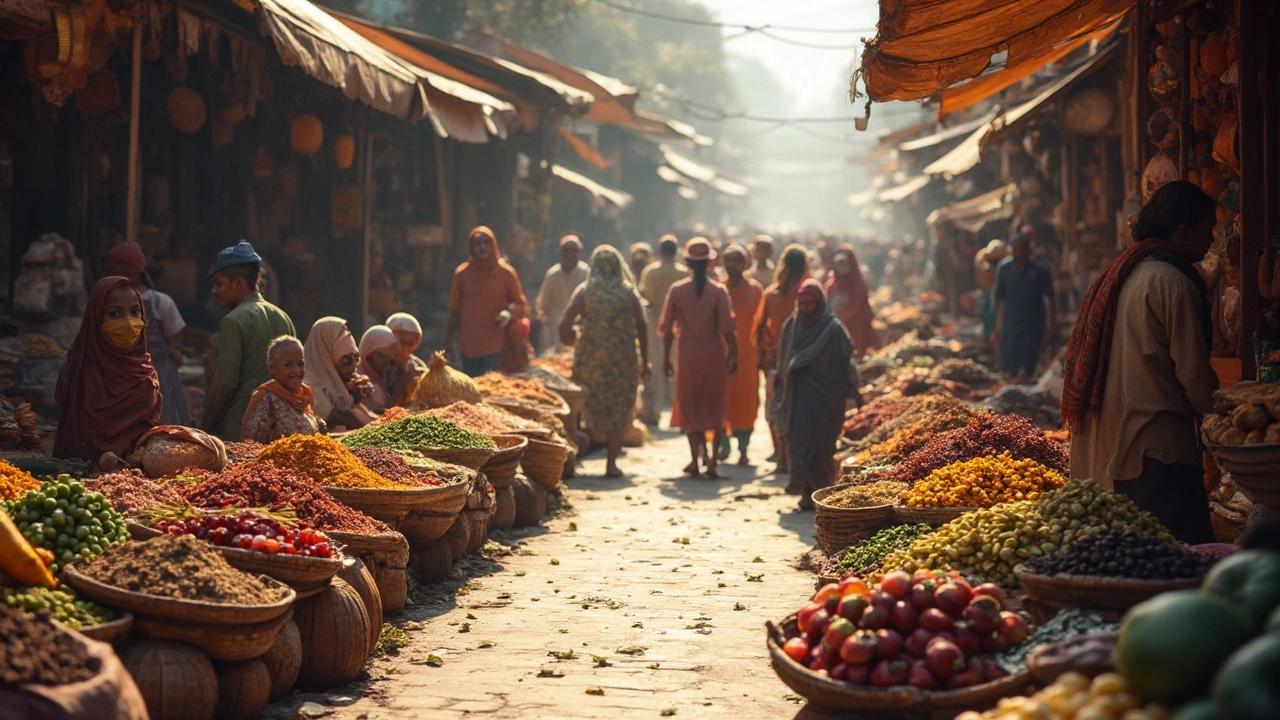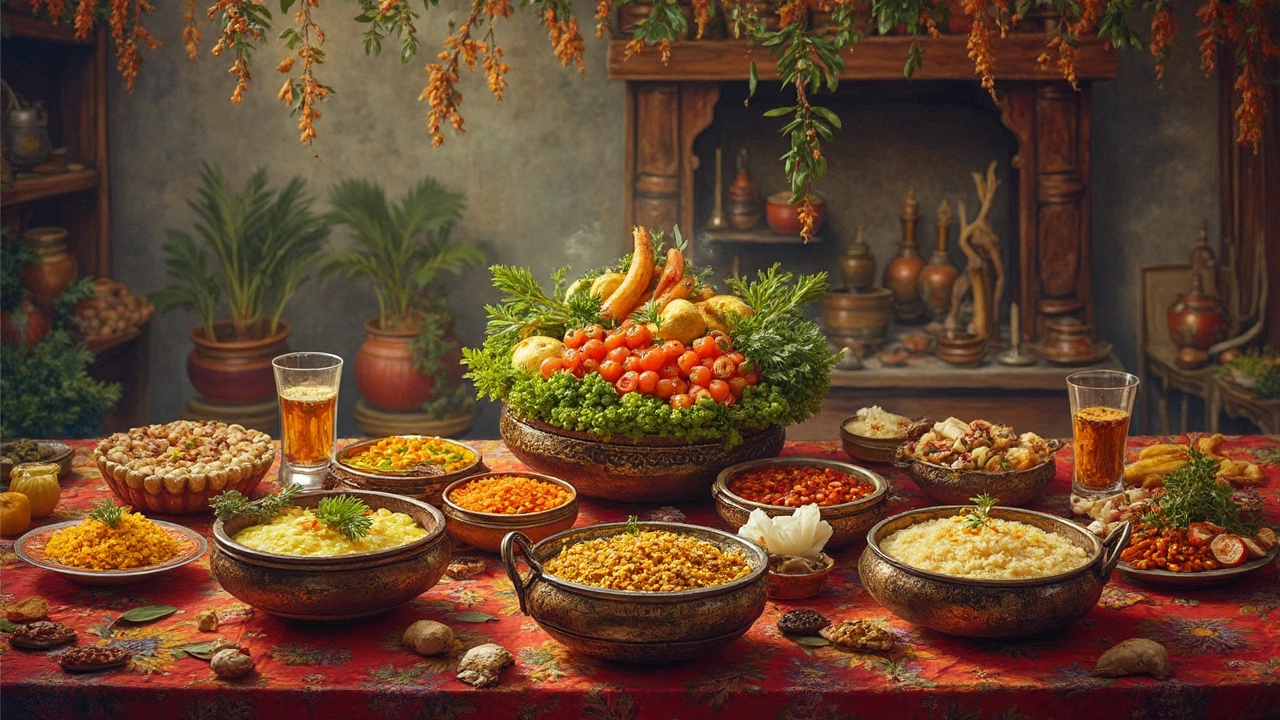1 Apr 2025
- 0 Comments
You know how when you travel around the world, food habits change dramatically? It's fascinating, right? Ever wondered about vegetarians in India and whether they eat eggs? It's kind of a big deal because, unlike many places where vegetarians include eggs in their diet, things are a bit different in India. Often, it's not just about personal choice but also about cultural and religious customs that sprinkle a whole new flavor into the mix.
So, what's the scoop? In India, vegetarianism isn't one-size-fits-all. The 'vegetarian spectrum' can span from not touching eggs and meat at all, to being okay with dairy but not eggs, to also sometimes including eggs. It's almost like each family, even each person, might have their own rules. Crazy, huh?
This gets even more interesting when you tie in the cultural strings. Religion plays a massive hand; for example, many Hindus and Jains avoid eggs due to beliefs tied to non-violence and purity. But let's be honest, India is huge, so dietary traditions aren't set in stone; they dance around religious thought and regional influences.
- The Vegetarian Spectrum
- Cultural and Religious Influences
- Eggs in Indian Cuisine
- Eggless Delights and Alternatives
The Vegetarian Spectrum
When we talk about the spectrum of Indian vegetarians, it's a bit like opening up a box of assorted chocolates—diverse and full of surprises. In India, vegetarianism doesn't always mean the same thing. Unlike the typical Western vegetarian who might include eggs as part of their diet, many Indians are what you would call 'pure vegetarians,' steering clear of meat and eggs altogether.
The concept of eating habits in India is deeply rooted in cultural and religious traditions. You've got your lacto-vegetarians, who are cool with dairy but strictly no eggs. Then there are those who are okay with eggs, often labeled as 'eggetarians.'
It's interesting to note that around 29% of India's population is vegetarian, but the approach within that group varies widely. For instance, South Indian Brahmins are typically strict vegetarians, while in other parts, like Bengal, being vegetarian might mean you're open to eggs, especially given their popularity in street foods like egg rolls and omelets.
Let's look at it this way: the vegetarian practices in India can be influenced by multiple factors, including religious beliefs, regional preferences, and even household traditions. In many Jain families, abstaining from eggs is part of a broader philosophy that avoids any harm to living creatures. Meanwhile, some individuals might adapt their diet based on personal health choices or convenience, mixing a bit of modern adaptability with tradition.
So, when someone says they're a vegetarian in India, it's always a good idea to ask which version they're subscribing to. It's not just about eating habits; it's a lifestyle deeply connected to identity and community.
Cultural and Religious Influences
Dive into the mix of flavors and beliefs that make the Indian vegetarian table so unique. Here, religious and cultural influences totally shape what's on the menu, and it often doesn't include eggs.
In Hinduism, one of the key religions in India, following a vegetarian diet is super common. Hindus usually stick to plants and dine on dairy but often drop the idea of eating eggs. The reason? It's deeply tied to the idea of 'Ahimsa' or non-violence towards all living beings. Eggs, being life, don't really get a seat at the table.
Then there's Jainism, where the diet becomes even stricter. Forget eggs, they often avoid root vegetables like garlic and onions, considering them as harming living beings. Jains keep it pure!
But hang on! This isn't an across-the-board rule in India. With a bunch of different states and all those tasty regional foods, things vary. For instance, while many Gujarati families prefer a strict vegetarian diet that skips eggs, in places like Kerala or Bengal, eggs might sneak into the daily diet a bit more casually.
Check out the table below to see how dietary practices differ by religion:
| Religion | Dietary Practice |
|---|---|
| Hinduism | Vegetarian, generally avoids eggs |
| Jainism | Strict vegetarian, avoids eggs and certain plants |
| Buddhism | Varies; some sects follow vegetarianism |
Even with all these diverse practices, family traditions, regional preferences, and personal choices often have the final say. So, if you chat with different folks from India, you might just end up with a whole bunch of fascinating views on whether eggs fit into a vegetarian diet.

Eggs in Indian Cuisine
You might think that with such a huge range of vegetarian dishes, eggs would pop up somewhere in Indian cuisine, right? Well, yes and no. It's kind of a mixed bag. In some regions of India, eggs are a part of daily meals, while in others, they're as rare as finding snow in Chennai.
Usually, in places like Bengal and Kerala, you'll find folks more open to including eggs in their diet. Eggs can show up in curries, or as side dishes with roti or rice. But here's the catch—this is more common in non-vegetarian households or among those who identify more along the lines of 'egg-itarian', folks who consider eggs as an exception.
Now, slide over to Gujarat or Rajasthan, and it's a different story. Many traditional dishes there are strictly egg-free. Ever tried a Gujarati thali? It's a whirlwind of flavors without a trace of egg. And then there's Rajasthani cuisine, with its mind-blowing use of legumes, dairy, and spices that make you wonder why you need eggs at all!
Here's a quirky bit: in certain parts of India, eggs are sometimes considered 'non-veg', which can confuse many Westerners. It's all about perception, influenced by religious beliefs and cultural norms.
When eggs do feature in Indian staples, they often appear in dishes like the famous 'egg curry'. It’s a spicy delight that many egg-lovers wouldn’t want to miss. Maybe not as common in strictly vegetarian circles, but they have their fans!
So, are eggs embraced universally in Indian cuisine? Not exactly. Think of them as a part-time player in this diverse food scene, appearing on certain plates but skipping many others entirely. Whether they make it to the table largely depends on personal beliefs and familial practices, creating a colorful patchwork of dietary preferences across India.
Eggless Delights and Alternatives
So you're curious about what happens when eggs are off the table? No worries, Indian cuisine is full of eggless delights that might just make you forget you ever needed them! With creativity in spades, Indians have cooked up all sorts of yummy dishes that skip the eggs entirely but pack a punch in flavor and nutrition.
Let's start with breakfast because, let's be real, who doesn't love a good morning meal? 'Besan Chilla' is a beloved option—it's like a savory pancake made from chickpea flour. Just mix in some chopped veggies and spices, and you've got a hot, crunchy start to your day.
Moving onto snacks, 'Samosas' and 'Pakoras' anyone? These might not scream healthy, but they're undeniably delicious—little parcels of spice and potato goodness. Pair them with chutney, and it's a match made in heaven.
What about the baked goods department, you ask? Welcome to the realm of eggless cakes and cookies! You'll find plenty of recipes that use yogurt, soda, or even bananas to get that fluffy texture. Trust me, once you've tried a good eggless chocolate cake, there's no going back!
Now, switching gears to creamy curries and stews, there are hearty dishes like 'Paneer Butter Masala' that stick to your ribs and fill you up. Paneer, a cheese made without rennet, is a staple in Indian homes, and it offers great protein without needing eggs.
Here's a quirky fact: did you know India has around 70 million vegetarians who choose not to eat eggs? To accommodate this, even street food and restaurant chains have adapted to offer fantastic eggless vegetarian options.
| Dish | Main Ingredient |
|---|---|
| Besan Chilla | Chickpea Flour |
| Paneer Butter Masala | Paneer Cheese |
| Eggless Cake | Yogurt/Banana |
So, whatever your reason for steering clear of eggs—be it culture, religion, or just personal choice—there’s a wealth of Indian vegetarian options waiting to be explored. Grab a plate, and dig in!
